Written by Katie VanOeveren
February 2023
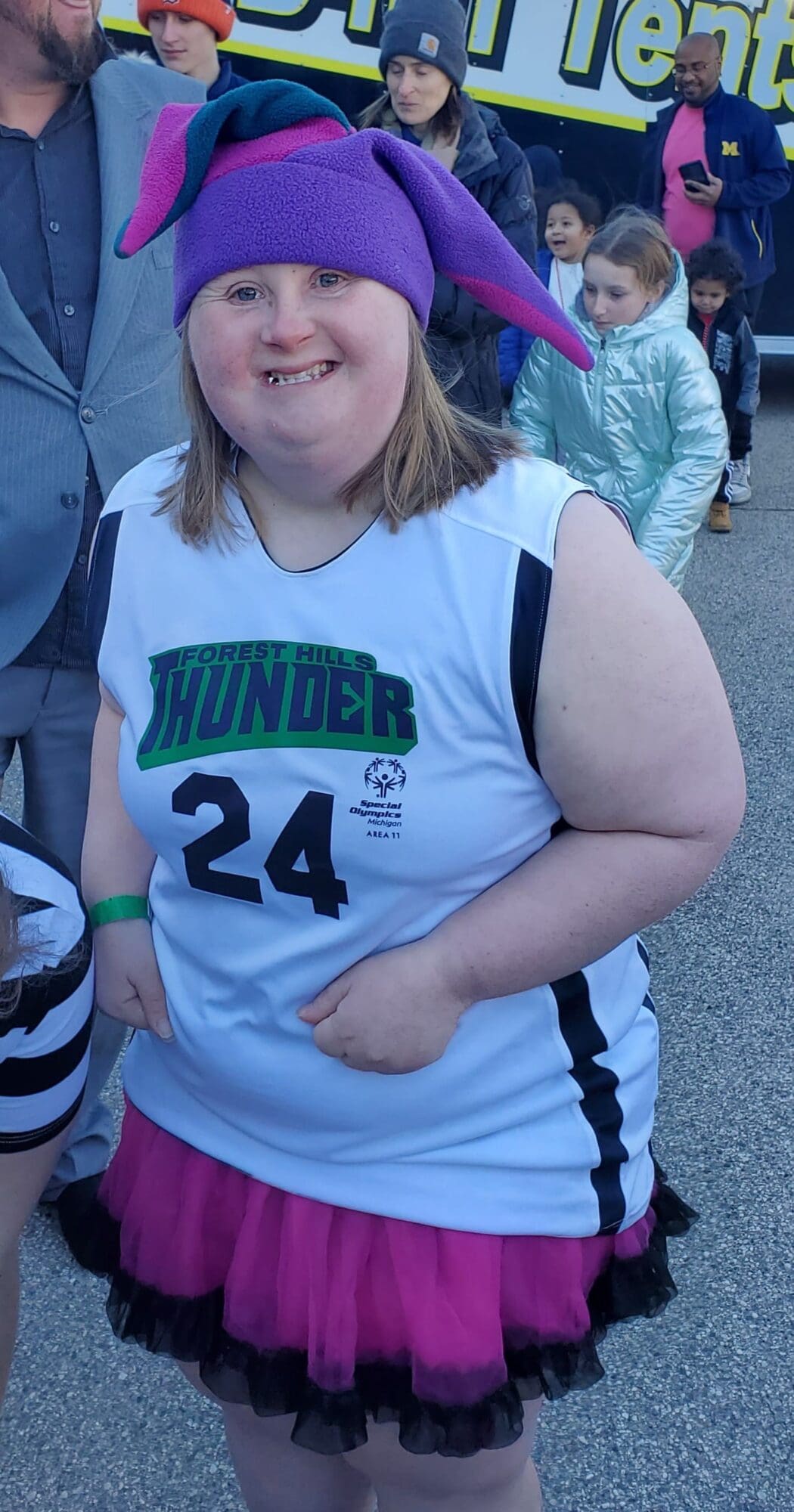
For the second time, I jumped in the Special Olympics Polar Plunge. I’m a Special Olympic athlete and I support my friends and my teams when I jump in the polar plunge. I like to be involved in a lot of activities and this in one way I can make other people aware that I do Special Olympic sports and that they can help out too.
I work with my mom and dad to make entertaining videos for Facebook, trying to get everyone excited to donate on my behalf. I have a lot of fun coming up with ideas and making the videos. I like the comments that I get. I also handed out a flyer at work, church, and other places to get people aware of the polar plunge and possibly get them to donate.
Last year, my goal was to raise $500 and I was really surprised when I raised just over $2000. This year I set my goal at $2000 and was even more surprised when everyone donated $3600 for me to jump in the cold water. That’s a really big amount.
Last year, the weather was terrible but this year the sun was shining but the water was still very cold. People ask me if I was scared to jump. I’m not scared but I don’t like the cold water. The energy of the crowd helps me get through jumping.
Thank you for supporting me and Special Olympics. I’m already making plans to jump again and hope you will be there to support me next year.
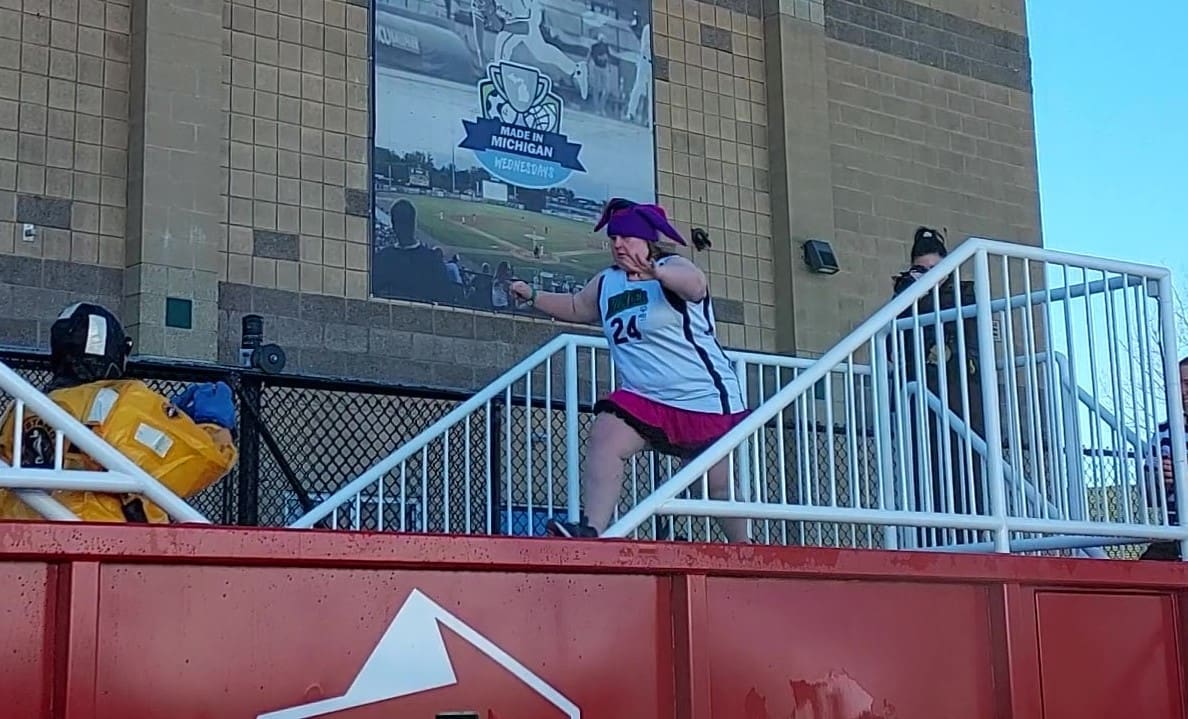
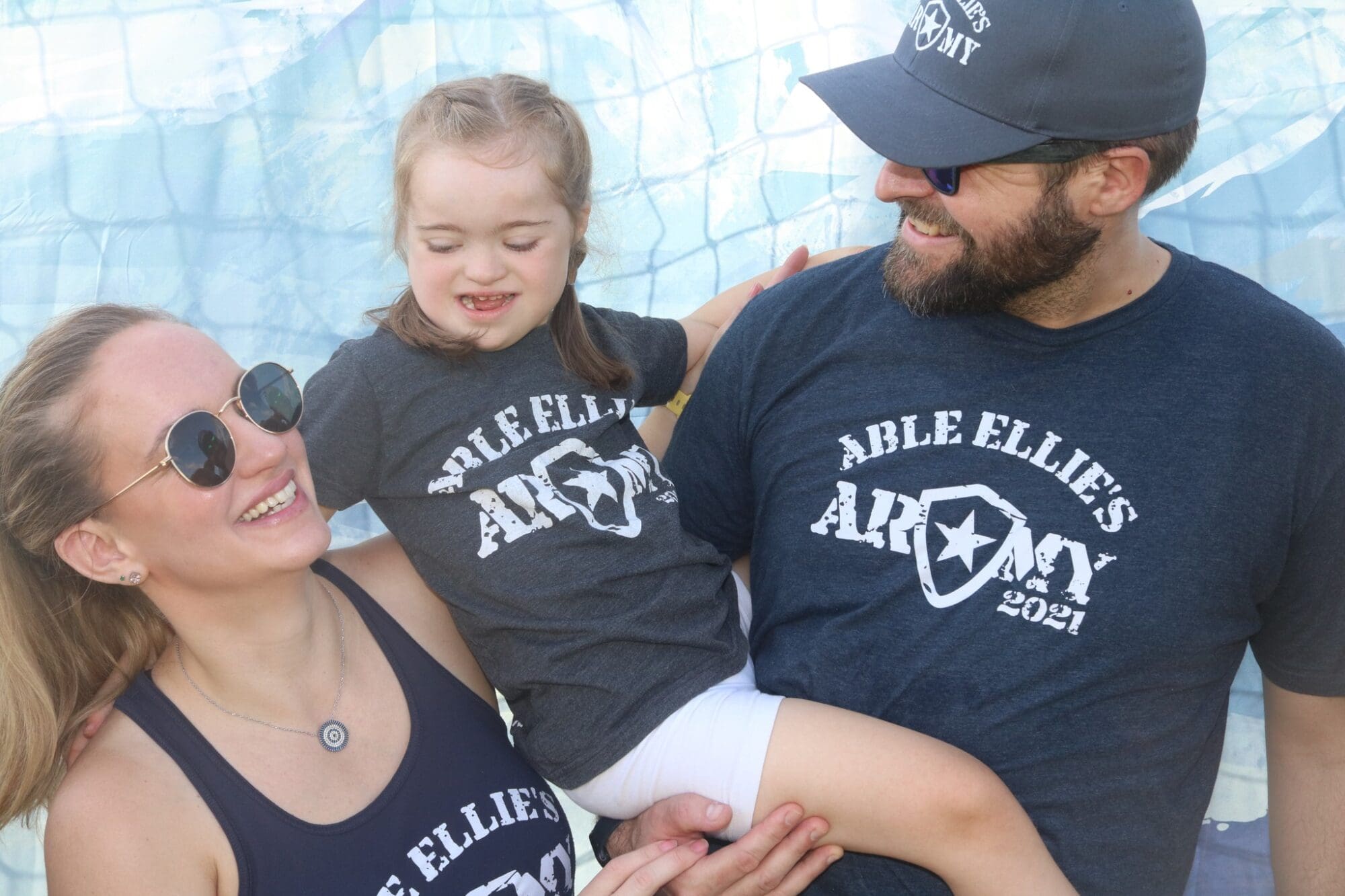

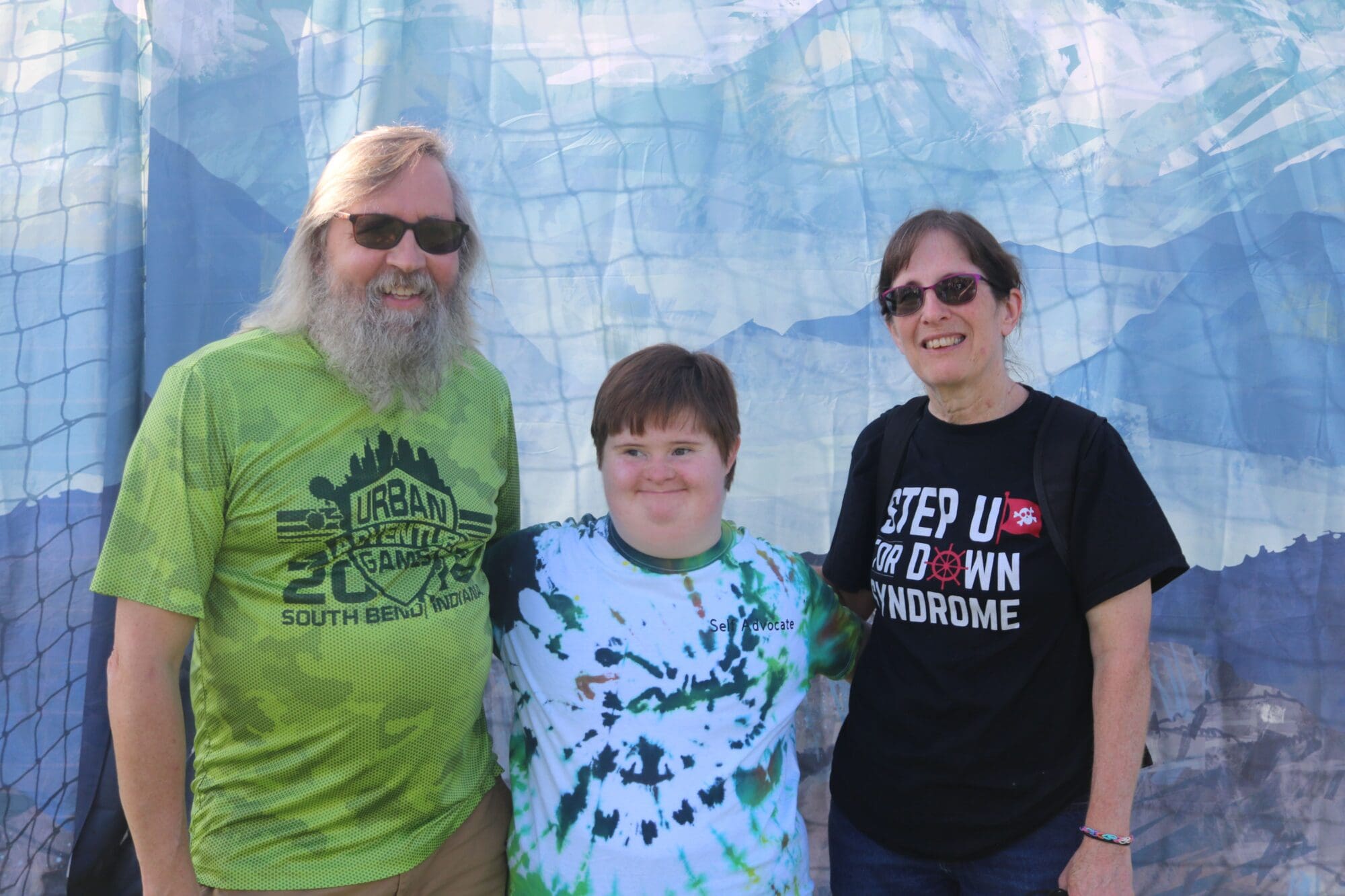
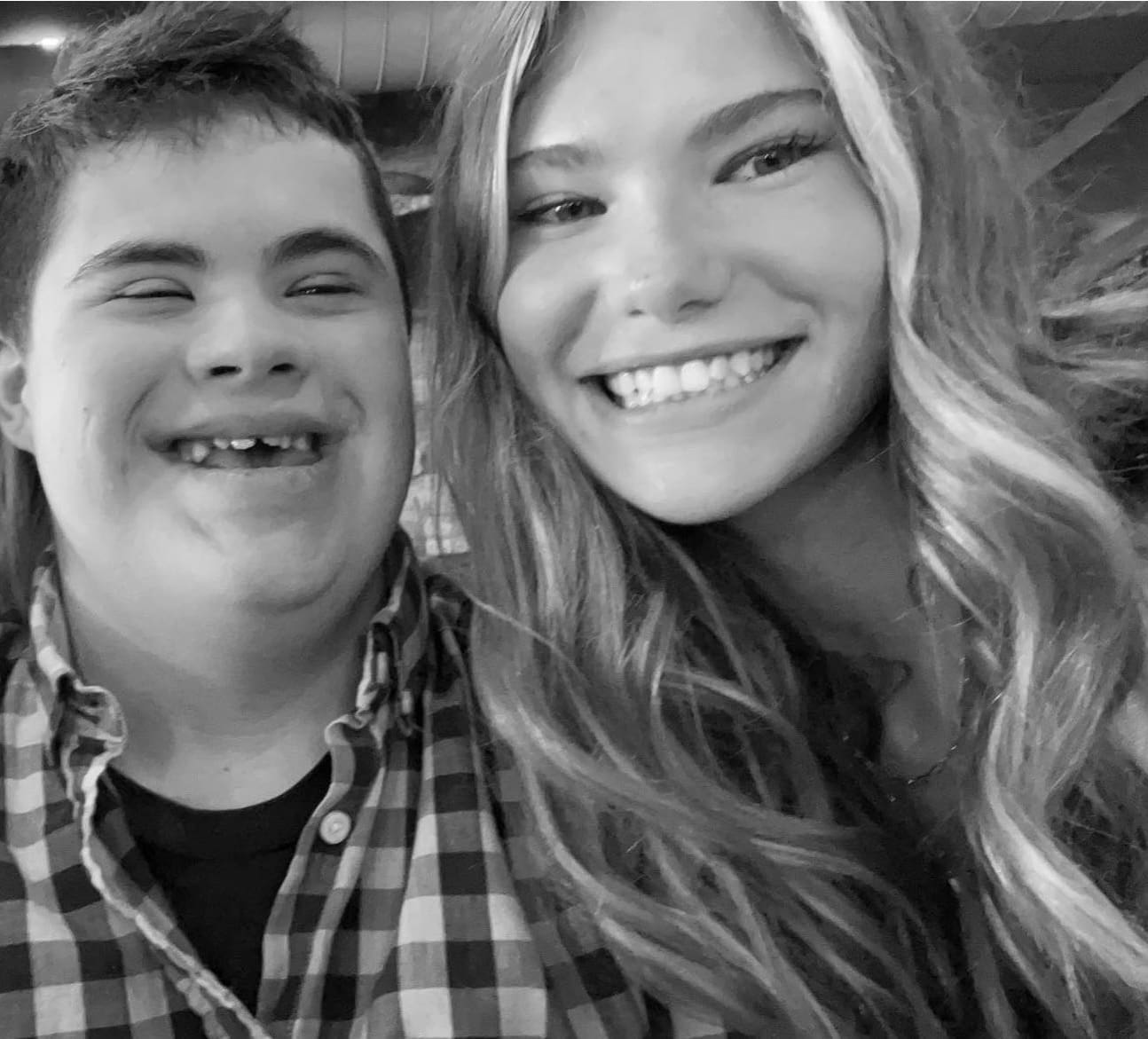


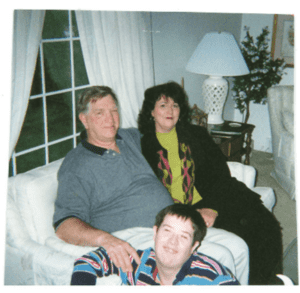
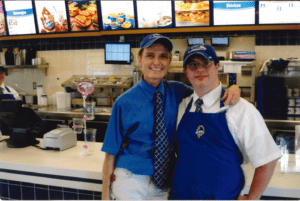

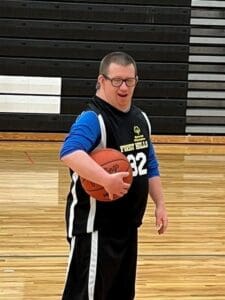
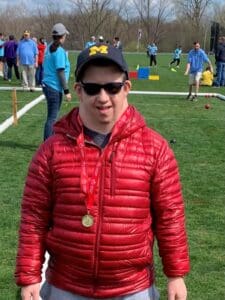
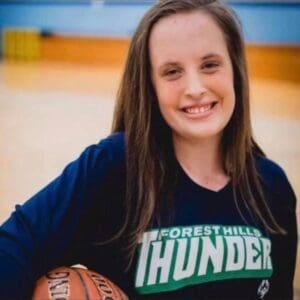 “Never give up,” is something I say to myself all the time. It means that the only way you can fail is if you stop trying. I learned that in Special Olympics.
“Never give up,” is something I say to myself all the time. It means that the only way you can fail is if you stop trying. I learned that in Special Olympics. In addition to being an athlete, I am also a student at Noorthoek Academy at GRCC, a Special Olympics Global Ambassador, a graduate of the Project Search Internship Program for adults with special needs, and the first ever special needs adult to be hired as a full-time employee in the surgical department of Spectrum Health. Three years ago, I was asked to be an athlete representative on the “Building Tomorrow’s Champions” Capital Campaign Cabinet to raise $10 million to renovate the old South Christian High School into the largest Special Olympics training facility and Inclusion Center in the world!
In addition to being an athlete, I am also a student at Noorthoek Academy at GRCC, a Special Olympics Global Ambassador, a graduate of the Project Search Internship Program for adults with special needs, and the first ever special needs adult to be hired as a full-time employee in the surgical department of Spectrum Health. Three years ago, I was asked to be an athlete representative on the “Building Tomorrow’s Champions” Capital Campaign Cabinet to raise $10 million to renovate the old South Christian High School into the largest Special Olympics training facility and Inclusion Center in the world!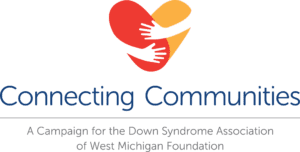 Earlier this month, the leadership of the Down Syndrome Association of West Michigan Foundation (DSAWMF) announced the Connecting Communities campaign, an $850,000 fundraising effort to move their headquarters to the new Special Olympics facility in Byron Center, expand staff and programming services, and build sustainability through an enhanced endowment fund.
Earlier this month, the leadership of the Down Syndrome Association of West Michigan Foundation (DSAWMF) announced the Connecting Communities campaign, an $850,000 fundraising effort to move their headquarters to the new Special Olympics facility in Byron Center, expand staff and programming services, and build sustainability through an enhanced endowment fund.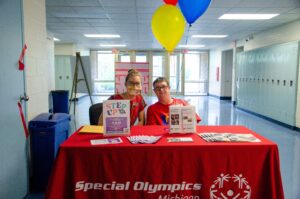 DSAWMF and DSAWM leaders have already relocated their offices to the Special Olympics campus at 160 68th Street SW. The facility, formerly South Christian High School, has been transformed into the largest Special Olympics training and inclusion center in the world. The new facility provides significantly more space for Special Olympics and DSAWM program staff, volunteers, and area youth and adults.
DSAWMF and DSAWM leaders have already relocated their offices to the Special Olympics campus at 160 68th Street SW. The facility, formerly South Christian High School, has been transformed into the largest Special Olympics training and inclusion center in the world. The new facility provides significantly more space for Special Olympics and DSAWM program staff, volunteers, and area youth and adults.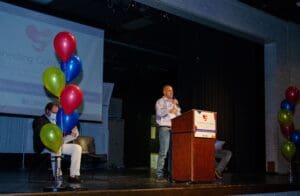 “The invitation to join the Special Olympics at this new campus was a once-in-a-lifetime opportunity,” said Leach. “As we work to provide the very best in programming for children and adults with Down syndrome, I am pleased to be part of an effort that truly gives area families a strong support network, provides children with a place where they feel like they belong, and builds partnerships with like-minded organizations,” he said. “Demand for our programs is increasing,” said Kloeckner. “Currently, we are providing support to nearly 350 people with Down syndrome in the counties we serve, and we anticipate serving many more families over the next several years as West Michigan grows.”
“The invitation to join the Special Olympics at this new campus was a once-in-a-lifetime opportunity,” said Leach. “As we work to provide the very best in programming for children and adults with Down syndrome, I am pleased to be part of an effort that truly gives area families a strong support network, provides children with a place where they feel like they belong, and builds partnerships with like-minded organizations,” he said. “Demand for our programs is increasing,” said Kloeckner. “Currently, we are providing support to nearly 350 people with Down syndrome in the counties we serve, and we anticipate serving many more families over the next several years as West Michigan grows.”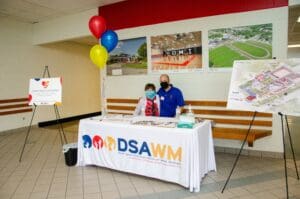 “This is an exceptional opportunity for our community to help build a strong network of support for children and adults that sometimes struggle to find activities and opportunities that meet their abilities,” said Leach. “If we can provide the venue, we know we can reach more families.”
“This is an exceptional opportunity for our community to help build a strong network of support for children and adults that sometimes struggle to find activities and opportunities that meet their abilities,” said Leach. “If we can provide the venue, we know we can reach more families.”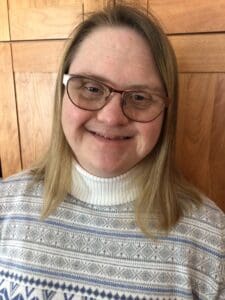 In just a few short days, my life was changed by COVID-19. Many of my routine activities were stopped and shut down. It felt like my life went upside down.
In just a few short days, my life was changed by COVID-19. Many of my routine activities were stopped and shut down. It felt like my life went upside down.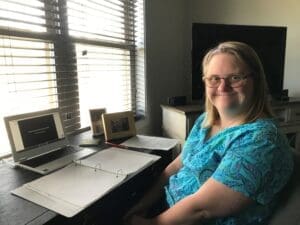 We all tried to make the best of the shutdown. I did lots of crafts. I made a blanket, colored pictures to give to friends and family, did my stamping, melted beads, and painted. We played lots of games like dominoes, Sequence, and Kings in the Corner. I read books and watched movies. We went for lots of walks at the beach and on trails at the parks. It was good to get fresh air! Of course, I did a lot of writing too! I learned how to make a homemade frosty and lots of delicious desserts. I learned how to make chocolate chip cookies! I even made dinner for my parents. People found ways to keep occupied in our own homes. We all had to make good choices.
We all tried to make the best of the shutdown. I did lots of crafts. I made a blanket, colored pictures to give to friends and family, did my stamping, melted beads, and painted. We played lots of games like dominoes, Sequence, and Kings in the Corner. I read books and watched movies. We went for lots of walks at the beach and on trails at the parks. It was good to get fresh air! Of course, I did a lot of writing too! I learned how to make a homemade frosty and lots of delicious desserts. I learned how to make chocolate chip cookies! I even made dinner for my parents. People found ways to keep occupied in our own homes. We all had to make good choices.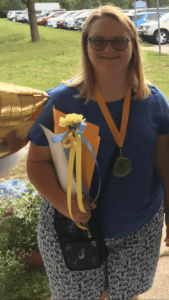 When I was able to get my vaccine, I was nervous, but I tried to stay calm. I am glad that my vaccines are done. The pandemic has changed some things. It has been hard, but look at the good things! We can see our friends again. We can go on vacations. Special Olympics is starting again. My church is back in-person on Sunday mornings. It’s easier to ride Harbor Transit to work and back to my apartment. I’m looking forward to going back to college at Noorthoek Academy in-person.
When I was able to get my vaccine, I was nervous, but I tried to stay calm. I am glad that my vaccines are done. The pandemic has changed some things. It has been hard, but look at the good things! We can see our friends again. We can go on vacations. Special Olympics is starting again. My church is back in-person on Sunday mornings. It’s easier to ride Harbor Transit to work and back to my apartment. I’m looking forward to going back to college at Noorthoek Academy in-person.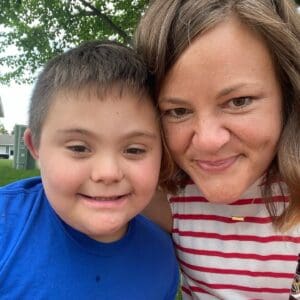
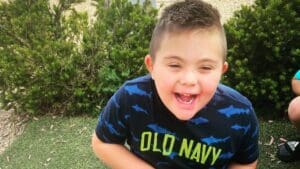 His screening took place at our local Children’s hospital. It took about 4 hours and part of us wondered if we would go and they would dismiss his behavior as “low functioning” Down syndrome. We had heard from other families who had gone through testing 5-10 years before that it wasn’t an uncommon phrase when they inquired about a dual diagnosis. At the end of the appointment, we heard the words, he has autism. They would of course have to write up the report and file all the paperwork, but we had our disability punch card punched again.
His screening took place at our local Children’s hospital. It took about 4 hours and part of us wondered if we would go and they would dismiss his behavior as “low functioning” Down syndrome. We had heard from other families who had gone through testing 5-10 years before that it wasn’t an uncommon phrase when they inquired about a dual diagnosis. At the end of the appointment, we heard the words, he has autism. They would of course have to write up the report and file all the paperwork, but we had our disability punch card punched again.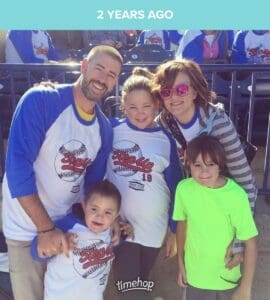 As a parent I still feel like I don’t quite fit at either party. I don’t totally fit in with the Down syndrome crowd and the same goes for the autism community. Owen doesn’t fit in either box either. I’ve decided that I may not be the only parent feeling this way. My goal is to be as transparent about our dual diagnosis life as possible, while still respecting our son’s autonomy. I also want to share our story to encourage any parent who is feeling what we were feeling that you are not alone. That statistics are showing that more and more people with Down syndrome also have autism. And if you suspect your loved one does, it’s always worth looking into.
As a parent I still feel like I don’t quite fit at either party. I don’t totally fit in with the Down syndrome crowd and the same goes for the autism community. Owen doesn’t fit in either box either. I’ve decided that I may not be the only parent feeling this way. My goal is to be as transparent about our dual diagnosis life as possible, while still respecting our son’s autonomy. I also want to share our story to encourage any parent who is feeling what we were feeling that you are not alone. That statistics are showing that more and more people with Down syndrome also have autism. And if you suspect your loved one does, it’s always worth looking into.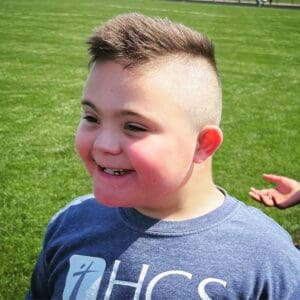 We still have difficult days, sometimes difficult seasons. We are all learning and growing and figuring out how to support Owen and one another as we move down this road. But we have hope again. The light is back in Owen’s eyes. He is a wonderful son, brother, and friend. He makes us laugh every day. He is blazing his own path and we could not be more proud of him.
We still have difficult days, sometimes difficult seasons. We are all learning and growing and figuring out how to support Owen and one another as we move down this road. But we have hope again. The light is back in Owen’s eyes. He is a wonderful son, brother, and friend. He makes us laugh every day. He is blazing his own path and we could not be more proud of him.



